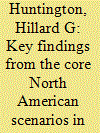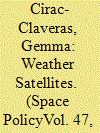| Srl | Item |
| 1 |
ID:
169312


|
|
|
|
|
| Summary/Abstract |
Space-based remote sensing is playing a prominent role for disaster management and socioeconomic development in Asia-Pacific. However, the unequal access to space technology in the region prompts the establishment of regional data-sharing agreements. This situation provides an opportunity for the region's leading space powers to enhance their regional influence. By invoking the concept of concept of Normative Power from the field of international relations, this article demonstrates (1) the applicability of this concept in the space sector, through an analysis of the European space sector and (2) the usefulness for decision-makers in advanced space powers to follow its methodological framework to design efficient strategies for enhanced regional influence. In particular, this paper argues that a tight collaboration with the Association of Southeast Asian Nations on space data sharing could participate in an ambitious Japanese diplomatic strategy of enhancement of its normative influence over the Asian space sector, in times marked by the rise of other powerful regional space actors.
|
|
|
|
|
|
|
|
|
|
|
|
|
|
|
|
| 2 |
ID:
138538


|
|
|
|
|
| Summary/Abstract |
One way to address the global challenges of public health in developing countries is through international collaboration to share data. It’s important to do this not just for humanitarian reasons but because open information is at the heart of scientific progress. One field in which this is particularly evident is genomic research, which has made revolutionary progress in recent years. Since the first genetic variation causing inherited disease (sickle-cell anemia) was defined at the protein level sixty years ago,1 it has become possible to locate, isolate, sequence, and clone individual genes. Indeed, there has been an explosion in research to discover the function of each of the twenty thousand or so human genes.
|
|
|
|
|
|
|
|
|
|
|
|
|
|
|
|
| 3 |
ID:
176860


|
|
|
|
|
| Summary/Abstract |
Within Canada, Mexico or the United States, policy-making organizations are evaluating energy markets and energy trade within their own borders often by ignoring how these countries’ energy systems are integrated with each other. These analytical gaps provided the main motivation for the Energy Modeling Forum (EMF) 34 study on North American energy integration and trade. This paper compares North American results from 17 models and discusses their policy motivation. Oil and natural gas production in the three major countries are modestly sensitive to crude oil and natural gas price changes, although these elasticities are below unity. Carbon taxes displace coal and some natural gas with renewables within all three power markets. Lower natural gas prices replace coal and some renewables with natural gas within electric generation. Higher intermittent renewable penetration in the power sector displaces coal and some natural gas. A key conclusion is that much remains to be done in integrating future analyses and in sharing and improving the quality and consistency of the underlying data.
|
|
|
|
|
|
|
|
|
|
|
|
|
|
|
|
| 4 |
ID:
149103


|
|
|
|
|
| Summary/Abstract |
Replication is widely seen as an important way to promote transparency and quality control of published work in the social sciences. In international relations, the replication movement moved forward with a panel at the International Studies Association in 2002, subsequently published in this journal. The publication included a joint statement by four editors of leading quantitative journals in international relations, pledging their journals to a set of minimum replication standards and urging other editors to follow suit. Over the years, these and other journals have posted hundreds of data sets. Nevertheless, progress has been slow, and many journals still have no policy on replication or fail to follow up in practice. In this forum, we discuss how improvements can be made to current policies and practices and how replication can be used systematically in teaching international relations and extended to qualitative work.
|
|
|
|
|
|
|
|
|
|
|
|
|
|
|
|
| 5 |
ID:
090335


|
|
|
| 6 |
ID:
169302


|
|
|
|
|
| Summary/Abstract |
This article examines the contested process through which satellite weather data collection is being transformed from a governmental mission to one increasingly carried out by the private sector. As illustration of this controversial transformation, it addresses the debates raised in the United States between some members of the National Oceanic and Atmospheric Administration, the Congress, private firms, academic meteorology and international observers between 2006 and 2017 regarding the commercialisation of data obtained from radio occultations using the Global Navigation Satellite System. It looks, in particular, at the arguments, discourses, viewpoints and perspectives of these involved actors. By focusing on one particular site of controversy—policies and practices of data distribution—this case study emphasises a clash of values between conventional norms of meteorology and commercial imperatives driving the private sector with respects to data sharing. The main interest of this article pertains to the broader issue of changing the current model for data gathering, using and sharing in the face of growing commercialisation of weather satellites.
|
|
|
|
|
|
|
|
|
|
|
|
|
|
|
|